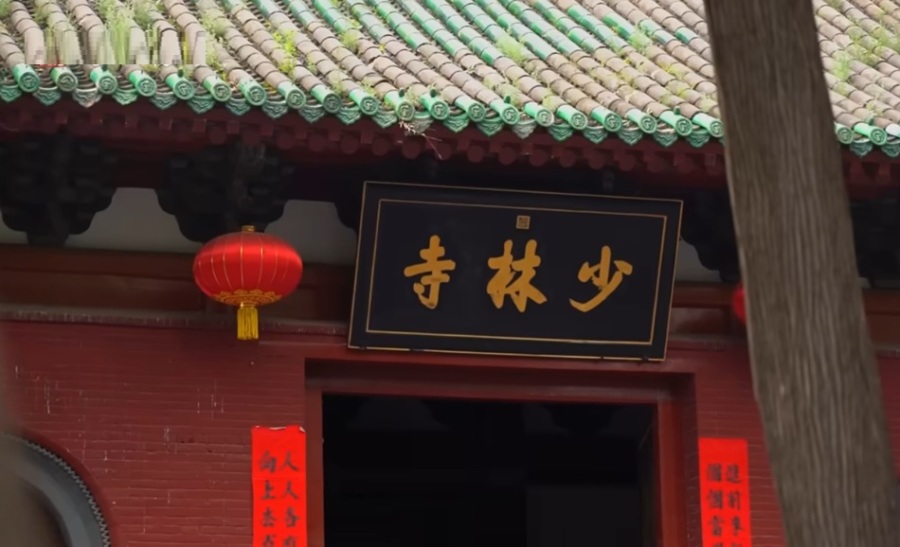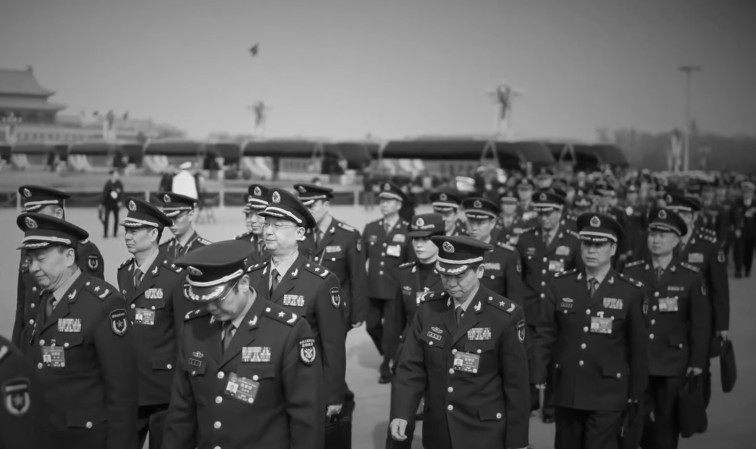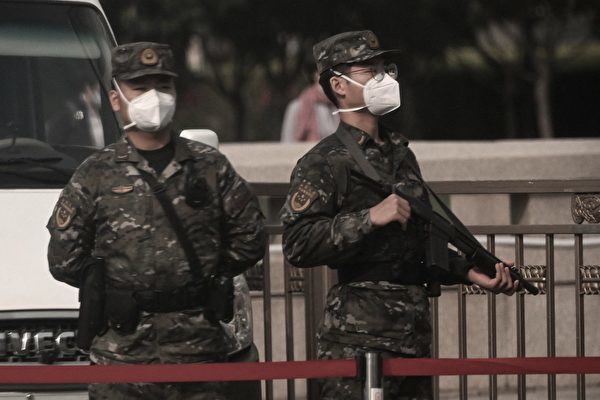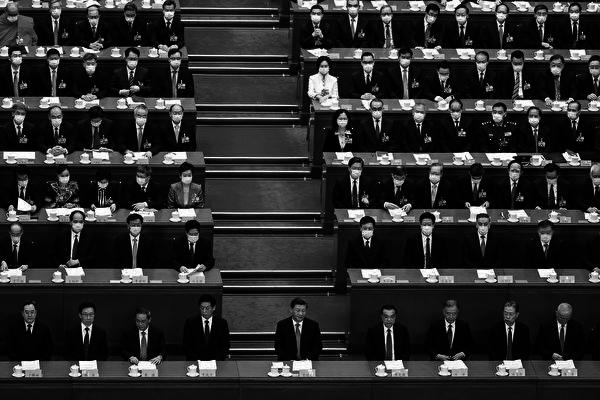A Historic Ancient Monastery: The Shaolin Temple (Video Screenshot)
[People News] Ever since Shi Yongxin, the abbot and CCP party secretary of Shaolin Temple, was detained, scandals and controversies surrounding China’s Buddhist community have become a hot topic. Now, the newly appointed abbot, Shi Yinle, has introduced a wave of reforms aimed at de-commercialising the temple, which has sparked a flurry of monk resignations and made headlines on Weibo on August 5.
According to widespread reports on Chinese social media, shortly after taking office in late July, Shi Yinle launched a series of reforms to remove commercial elements from the temple. These included cancelling profit-driven programs such as the "999-yuan phone blessing screen protector," shutting down the temple's QR code donation boxes, high-priced incense stalls, and its online Taobao store. Instead, he implemented a free incense offering policy or voluntary donation system. He also halted global martial arts performances by the Shaolin monks and severed their direct involvement in commercial income, ending the practice of monks receiving commission from product sales or performances. Regarding monastic discipline, Shi Yinle introduced stricter rules: monks are now required to wake up at 4:30 AM, engage in daily meditation, martial arts training, scripture recitation, eat a vegetarian diet, and participate in physical labour such as farming and building maintenance. They are also forbidden to leave the temple on weekends and public holidays, and visiting family requires a formal request and is limited to one week. These changes led to approximately 30 monks resigning in protest.
Online sources indicate that the departing monks mainly fall into three categories: Warrior monks and staff who relied on commercial activities for income; Young monks accustomed to a relaxed environment; Those aspiring to become "internet celebrity monks" and unwilling to endure hardships such as working in the fields.
The public reaction online has been mixed and full of sarcasm: “Shaolin Temple is just a big factory. When the benefits are good, people scramble to get in. Now the new factory manager is changing everything, and once the benefits are gone, the employees start quitting. How ironic.” “Monks resigning? So it was just a job, not truly leaving worldly life after all! No wonder many of them are self-interested. Perhaps they never had a pure heart to begin with.” “Being a monk is about chanting, meditating, and living simply. If you can’t endure a life without entertainment and with farm work, then leaving is for the best.” “How many of them are real monks, anyway?” “How many monks today actually believe in Buddha? It’s all about business now.” “Even monks inside the ‘system’ can’t handle this.”
On the night of July 27, 2025, the Shaolin Temple Management Office in Henan Province issued a public statement: Shi Yongxin, former abbot of Shaolin Temple, is under criminal investigation for embezzling and misappropriating project funds and temple assets. He has also seriously violated Buddhist precepts by maintaining improper relationships with multiple women over the years and fathering illegitimate children. He is currently under joint investigation by several government departments.
As one of China’s most renowned temples, the scandal involving Shi Yongxin has become a global news story. He earned numerous nicknames over the years, such as “Political Monk,” “Playboy Monk,” “Luxury Car Monk,” and “Shaolin CEO.” Over a decade ago, whistleblowers had already publicly accused Shi Yongxin of similar misconduct, matching the recent allegations made public. At the time, authorities claimed “there was insufficient evidence,” and he faced no consequences. He continued to make high-profile appearances at political, economic, and cultural events in China and abroad, becoming a CCP favourite cloaked in religious robes.
Shi Yongxin wasn’t just the temple’s abbot; he was also: Party Secretary of Shaolin Temple. President of China’s first Buddhist college, Henan Buddhist Academy. Four-time delegate to the National People’s Congress. Elected Vice President of the Buddhist Association of China in 2020. In essence, Shi Yongxin was a Communist Party cadre dressed in monastic robes. Just like other CCP officials, he followed Party orders, engaged in corruption, maintained mistresses, and amassed over $100 billion in assets. None of this is surprising given the deep rot in the CCP’s bureaucratic system.
Why does the CCP control religion?
Du Wen—a political commentator currently based in Europe and former executive director of the Legal Advisory Office of Inner Mongolia’s autonomous regional government—shared his insights on the program Elite Forum. He has previously served as legal advisor to high-level officials like Yang Jing, Bater, and Hu Chunhua. Du Wen stated that many of the problems in Chinese Buddhism were engineered by the CCP. The commercialisation of Buddhism, he said, is a CCP tactic designed to destroy religion from within.
He explained that he had met many high-ranking monks in China and witnessed firsthand the moral filth engulfing Chinese Buddhism. The entire religious landscape is obsessed with money, real estate, and commercial ventures—and all of it is supported by the CCP. In fact, he said, the CCP even funds religious commercialisation with the hidden goal of eradicating the spiritual core of these traditions.
Du Wen further quoted a former CCP Religious Affairs Bureau deputy director who once said: “Religious commercialisation is self-destruction.” The more commercialised religion becomes, the more it loses its moral compass, boundaries, and engages in unethical behaviour. He emphasised that the monks, lamas, and abbots within Chinese temples are all appointed by the CCP’s Religious Affairs Bureau, under the authority of the United Front Work Department. These are "party people" who do not follow traditional monastic discipline. As a result, their darker human tendencies take over—obsessed with money, women, and power. Murders and crimes are not uncommon. “The evil the Communist Party commits is beyond description,” he said. “All religions in China, including Buddhism, are disappearing.”
Why does the CCP want to eliminate religion?
Since its inception, the Chinese Communist Party has emphasised “Party leadership”—the Party must command the military, control the media, manipulate public opinion, dominate education, run businesses and schools, and—most importantly—control the minds of its people. The CCP’s mission is to brainwash Chinese citizens so that even their moral judgment—such as who is good or evil—is dictated by the Party. The ultimate goal of the CCP is to turn over a billion Chinese people into ideological descendants of Marx and Lenin—people without independent thought or spiritual conviction, obedient tools for the Party’s ends. Communism glorifies violence and class struggle. All members—whether Party members, Young Pioneers, or Youth League members—are expected to unconditionally obey the Party, rebelling against heaven, earth, and humanity. Their slogan: “Dedicate your life to the Party.”
This is fundamentally incompatible with traditional religions and divine teachings, which advocate belief in higher powers, moral retribution, and compassion. Because of this clash, the CCP seeks to eliminate all faiths and destroy traditional spiritual culture.
That is the true reason the CCP wants to destroy religion.
If Chinese citizens do not wish to become collateral damage in the downfall of the CCP, they must sever their ties with it—mentally, spiritually, and organizationally. One of the safest and most effective ways is through the “Three Withdrawals”: Resign from the Party, the Youth League, and the Young Pioneers.
(First published by People News) △









News magazine bootstrap themes!
I like this themes, fast loading and look profesional
Thank you Carlos!
You're welcome!
Please support me with give positive rating!
Yes Sure!